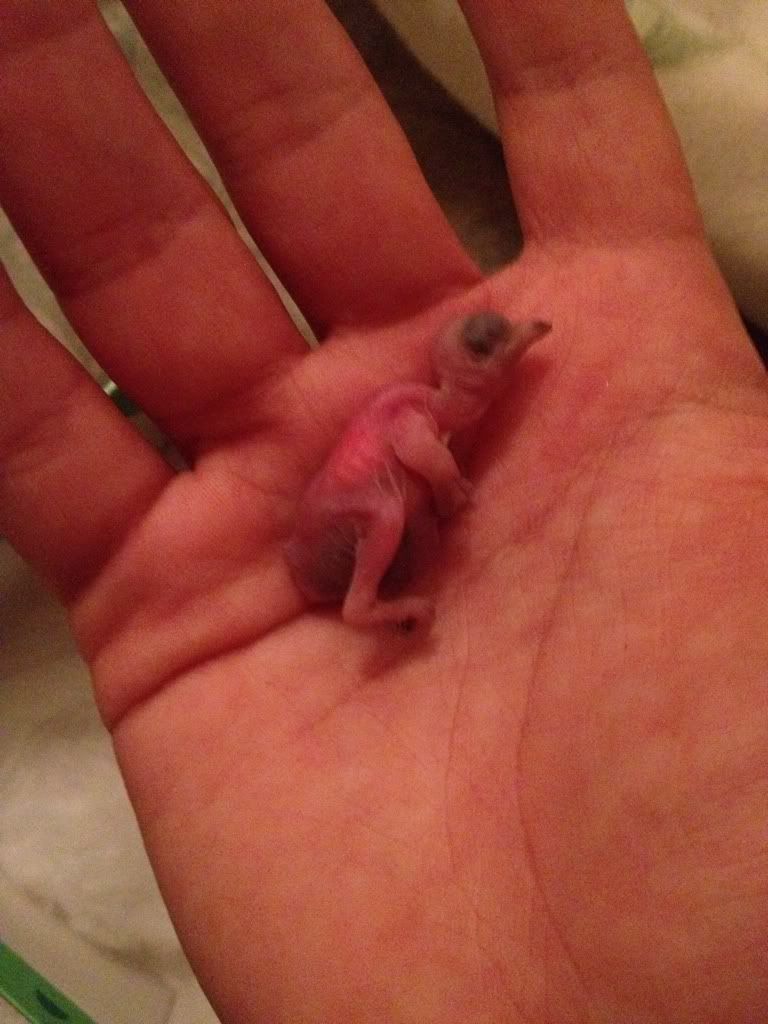Aww the poor thing! I hope it makes it - it's in good hands (well, hand)

As 'community' said, phone up an animal association. In the meantime, I've found some information:
- Observe the bird. Before touching the bird or stressing it in any way, watch to see if it can care for itself or if the parent birds are tending to it. Many times when a human spots a baby bird, they fail to see the nearby parents that are ready and willing to feed and protect their offspring. It may take a half hour or longer for parent birds to return to their baby, however, so patience is essential.
- Intervene as little as possible. In the case of fledglings, simply moving the bird to a sheltered nearby location where it is out of direct sun and in a protected spot is the best choice to give it a helping hand. Younger birds may require more help, but it is always best to interfere with the birds in only minimal ways.
- Return the bird to the nest. The best place for a baby bird to be is its own nest. If the hatchling is too young to be out of the nest, gently pick it up and place it back in its nest if you can find it. If you are unable to find the nest or it is unreachable or destroyed, line a small basket such as a pint fruit basket with tissue or grass clippings and place it in the tree as close to the nest site as possible. Be sure the basket is secure (nail it to the tree if necessary) so the baby bird will not tumble out. The parent birds will hear their baby and find it easily, and since most birds have a poor sense of smell, they will not abandon it because it has been handled by humans.
- Keep the bird safe. If the bird is in imminent danger from a damaged nest, predators or other unsafe conditions, or if it is visibly injured or ill, place it in a small box lined with tissues, paper towels or similar material and cover the top of the box loosely with newspaper or a towel. If necessary, keep the bird indoors in a quiet, safe location until outdoor conditions improve or until a wildlife rehabilitator can take the bird for proper care.
Orphaned Baby Birds
There will be times when birders know for certain that a young bird is an orphan. The parent birds may have been killed by a predator or a window strike, or a nest with living babies may be obviously abandoned for far longer than normal. In these cases, it will be necessary to collect the young birds and turn them over to a licensed wildlife rehabilitator for proper care. Note: in most areas, it is illegal to keep wild birds in captivity even if you plan to release them – always seek the assistance of a knowledgeable rehabilitator instead of trying to raise baby birds yourself. Even well-intentioned birders who try to raise baby birds can cause more harm than good, since young birds require specialized diets and the company of their own kind to learn necessary skills for survival in the wild.
Tips for What to Do When You Find Baby Birds
To give baby birds the best chance of survival when you find them…
- Stress the birds as little as possible. Avoid excessive handling, loud noises or unfamiliar conditions, and keep them close to where they were found in case the parent birds return.
- Always wear gloves when handling young birds. Even baby birds can carry mites, lice, ticks, bacteria and other unpleasant parasites that can be transferred to humans. After handling a bird, wash your hands thoroughly with soap and warm water.
- Do not give baby birds food or water. While this may seem counter-intuitive to helping baby birds, young birds have precise dietary needs that can't be met with kitchen scraps, birdseed or other foods. Young birds need live insects for protein to develop properly, and their parents will feed them 3-4 times every hour to meet that need. Offering improper food can cause a young bird to choke or become malnourished. Instead, wait for the parent birds or a wildlife rehabilitator to feed the baby bird a proper diet.
Source: http://birding.about.com/od/birdingbasi ... ybirds.htm
Hope this helps!



